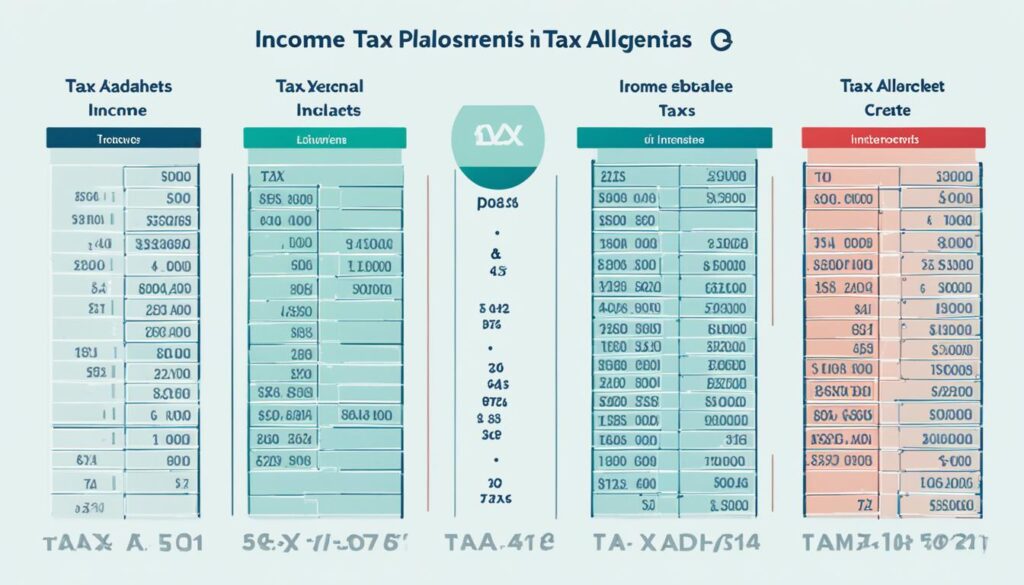Welcome to the comprehensive exploration of the taxation landscape in Indonesia. Understanding the complexities of the Indonesian tax system is essential for both individuals and corporations aiming to fulfill their tax obligations. Recent changes in tax regulations in Indonesia have introduced new rates and compliance requirements that can impact your financial planning. This guide will delve into key components like personal and corporate tax structures, the filing process, and critical updates that shape the current taxation environment.
Key Takeaways
- The Indonesian fiscal year runs from January 1 to December 31.
- Non-residents must register for a Tax ID if their stay exceeds 183 days within a year.
- Income tax rates for residents vary from 5% to 35%, being progressive based on total taxable income.
- Corporations with gross income up to Rp 50 billion can benefit from a 50% tax discount on certain income.
- Late filing of the Annual Income Tax Return incurs a sanction of IDR 100,000 and additional penalties.
Unlock Investment Opportunities Abroad!
Overview of the Indonesian Tax System
The Indonesian tax system is multifaceted, encompassing various components such as income tax, value-added tax (VAT), and numerous other tax obligations. Understanding the Overview of the Indonesian tax system is crucial for both residents and expatriates to navigate their financial responsibilities in the country.
Key Components of Indonesian Taxes
Individuals are subjected to progressive income tax rates ranging from 5% to 35% based on their earnings, while expatriate workers adhere to a self-assessment scheme for personal income tax1. The taxation system incorporates a worldwide income model for residents, encompassing taxes on local and foreign income, barring any double tax agreements. Non-residents are taxed solely on Indonesian-source income unless a favorable tax treaty applies1. Additionally, certain foreign individuals, such as diplomats, enjoy exemptions from paying personal income tax1. Each taxpayer is required to file tax returns annually, compute their liabilities, and fulfill any provisional payments if necessary, marking a strict but manageable obligation for all involved in the economy.
Recent Tax Legislative Changes
In recent years, Indonesia has enacted significant changes in its tax regulations, especially following the Harmonization of Tax Regulations Law aimed at enhancing revenue collection amid economic recovery challenges. Recent tax changes in Indonesia included adjustments to VAT and clarification on corporate tax structures2. Furthermore, the stratification of taxation laws, such as the Omnibus Law on Job Creation, plays a crucial role in defining the responsibilities of both individuals and corporations regarding compliance and payments2. Taxpayers must navigate these evolving frameworks, which incorporate various laws from income and luxury goods tax to local duties, further influencing their obligations and compliance processes.
Corporate Tax in Indonesia

Understanding the framework of corporate tax in Indonesia is essential for any business operating within the country. The corporate income tax rates are set primarily at 22%, applying uniformly to the majority of companies. Exceptionally, public companies that provide at least 40% of their capital in shares may receive a reduced tax rate of 19%, thanks to a three percent tax discount offered under certain conditions34.
Current Corporate Income Tax Rates
As it stands, the corporate income tax rate remains at 22% for the fiscal year. Companies classified as small enterprises with annual revenues not surpassing 50 billion rupiah can access a significant 50% reduction on the standard rate34. Furthermore, businesses with gross turnovers up to 4.8 billion rupiah will pay a nominal rate of 0.5% on their turnover, enhancing the accessibility of tax compliance for smaller firms34.
Incentives and Deductions Available to Corporations
Various tax incentives in Indonesia are tailored to encourage investment and development in specific sectors. For instance, businesses investing amounts between 100 billion and 500 billion rupiah can experience a 50% corporate income tax reduction over five years4. More substantial investments over 500 billion rupiah might enjoy a complete exemption on CIT for terms ranging from five to twenty years, which is a strong motivation for larger projects4.
Additionally, the government has instituted special allowances for a variety of industries, including textiles, pharmaceuticals, and automotive manufacturing4. These incentives not only facilitate business growth but are crucial for fostering a competitive economic landscape in Indonesia.
Understanding Personal Income Tax in Indonesia

Personal income tax in Indonesia varies significantly based on annual income levels. Understanding the personal income tax rates in Indonesia is essential for compliance and financial planning. The tax system divides taxable income into brackets with corresponding tax rates ranging from 5% for incomes up to IDR 60 million to as high as 35% for those exceeding IDR 5 billion5. This progressive scale aims to fairly distribute the tax burden according to a taxpayer’s ability to pay.
Personal Income Tax Rates
The hierarchy of personal income tax rates is crucial. Here’s a breakdown of the applicable rates:
| Income Bracket | Tax Rate |
|---|---|
| Up to IDR 60 million | 5% |
| IDR 60 million to IDR 250 million | 15% |
| IDR 250 million to IDR 500 million | 25% |
| IDR 500 million to IDR 5 billion | 30% |
| Above IDR 5 billion | 35% |
Unlock Investment Opportunities Abroad!
Eligibility and Filing Requirements
Eligibility for personal income tax in Indonesia is determined primarily by residency status. An individual becomes a tax resident if they reside in Indonesia for more than 183 days or have a permanent intention to stay. Therefore, understanding the filing requirements for personal income tax is vital for both residents and non-residents. Filers must complete their annual tax returns by March 31 following the previous year. Failing to meet these deadlines can lead to penalties, including fines of IDR 100,000 for late reporting6.
Exemptions and Deductions
Taxpayers can benefit from various exemptions and deductions in Indonesia, particularly for expenses related to education and research. These tax credits not only reduce the taxable income but encourage investments in sectors vital for economic growth. Understanding these opportunities can significantly enhance tax efficiency for residents. Required documents for filing include a Tax Identification Number (NPWP) and an EFIN6 as mandated by the tax authority.
Taxes in Indonesia: Filing and Compliance

Understanding the intricate processes surrounding tax filing in Indonesia is essential for individuals and employers alike. This ensures proper adherence to compliance with Indonesian tax laws as well as fulfilling all obligations with the tax authority. Both parties play vital roles in maintaining effective tax administration.
Tax Filing Procedures for Individuals
To comply with tax regulations in Indonesia, an individual must first acquire a tax identification number known as NPWP. Following this, the annual tax return must be submitted by March 31, thus emphasizing the significance of timely tax filing in Indonesia. Expatriates, who are considered tax residents, must observe the same requirements and engage in self-assessment for their income. They must keep diligent records during their stay, which ensures they can continue to fulfill their compliance obligations even after leaving the country. In Indonesia, late payment of taxes incurs interest penalties based on the Ministry of Finance Interest Rate along with applicable surcharges7. Moreover, various administrative penalties apply for late tax filings, with fines of IDR 500,000 for VAT returns, IDR 100,000 for other monthly tax returns, and IDR 1,000,000 for corporate income tax returns7.
Employer Responsibilities for Tax Compliance
Employers in Indonesia hold significant employer tax responsibilities, particularly in withholding and remitting taxes from employees’ salaries. They are required to ensure accurate tax submissions monthly to the tax authority. This plays a crucial role in overall tax compliance, reducing the likelihood of facing audits or penalties. The tax system in Indonesia conducts audits particularly on high-risk taxpayers to verify compliance, focusing on both local and foreign earnings1. Each month, employers must submit withheld taxes, while expatriates are expected to file their annual returns, maintaining clear communication about their tax obligations8.
| Type of Tax Return | Submission Deadline | Penalty for Late Filing |
|---|---|---|
| VAT Return | Last Day of the Following Month | IDR 500,000 |
| Other Monthly Tax Returns | Last Day of the Following Month | IDR 100,000 |
| Corporate Income Tax Return | March 31 of Following Year | IDR 1,000,000 |
In conclusion, each individual’s understanding of their responsibilities and prompt adherence to filing rules is vital in achieving successful compliance with Indonesian tax laws. Adhering to these processes helps mitigate penalties and fines, fostering a smoother experience in navigating the Indonesian tax landscape7.
Conclusion
Understanding the Indonesian tax system is crucial for both individuals and corporations to ensure compliance with local regulations. The summary of taxes in Indonesia reveals a structure comprising corporate income tax rates that stand at generally 22%, with special discounts available for small enterprises, among other considerations9. Moreover, personal income tax is also a key component, which requires taxpayers to navigate their filing obligations properly.
Staying informed about understanding Indonesian tax obligations, including VAT rates that fluctuate between 5% and 15%, and the complexities around tax filings and compliance, is essential for alleviating potential penalties and ensuring a smooth process10. For expatriates and businesses, the intricacies of the tax landscape further emphasize the importance of consulting with local tax professionals, who can provide tailored guidance based on individual circumstances.
In conclusion, taking the initiative to understand these critical aspects of the tax system will not only help in compliance but can also facilitate the maximization of available incentives. For more detailed information about tax regulations and obligations in Indonesia, refer to this comprehensive resource: guidance on Indonesian tax administration.
Unlock Investment Opportunities Abroad!
FAQ
What are the main taxes individuals have to pay in Indonesia?
How does the tax system treat residents and non-residents differently?
What is the current corporate tax rate in Indonesia?
Are there tax incentives available for corporations?
What is the procedure for filing personal income tax returns in Indonesia?
What are the employer's responsibilities regarding taxes in Indonesia?
How can expatriates ensure they meet their tax obligations in Indonesia?
How are tax refunds processed in Indonesia?
Source Links
- https://www.aseanbriefing.com/doing-business-guide/indonesia/taxation-and-accounting/individual-income-tax
- https://en.wikipedia.org/wiki/Taxation_in_Indonesia
- https://taxsummaries.pwc.com/indonesia/corporate/taxes-on-corporate-income
- https://www.aseanbriefing.com/news/a-guide-to-corporate-income-tax-in-indonesia/
- https://nnroad.com/blog/individual-income-tax-in-indonesia/
- https://ilaglobalconsulting.com/personal-income-tax-indonesia/
- https://taxsummaries.pwc.com/indonesia/corporate/tax-administration
- https://www.aseanbriefing.com/news/a-guide-to-taxation-in-indonesia/
- https://www.pwc.com/id/en/pocket-tax-book/english/pocket-tax-book-2024.pdf
- https://taxsummaries.pwc.com/indonesia/corporate/other-taxes

Comments